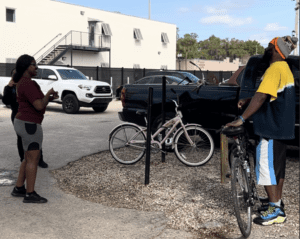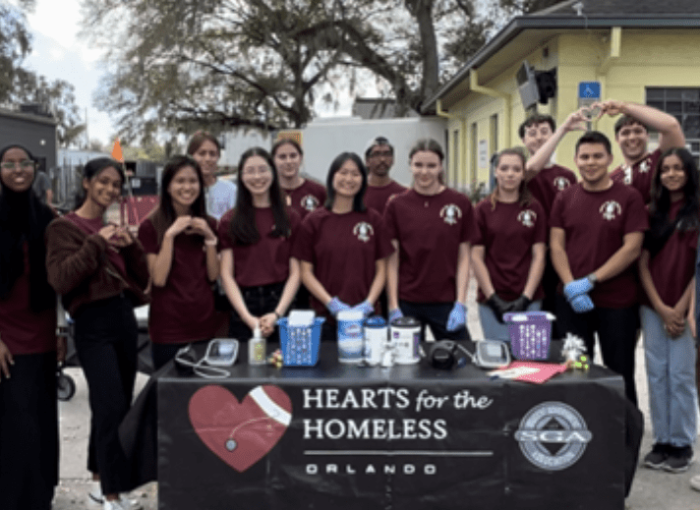By Emily Liu
Florida has the third-largest homeless population in the United States. In Orlando when people have nowhere to go, they turn to the Christian Service Center for Central Florida (CSC). At the CSC, multiple organizations convene to tackle specific parts of the complex homelessness issue, offering services from health screenings to haircuts. Together, these organizations act as a safety net for one of the most vulnerable populations in the nation.
One of the organizations that shows up each week is a registered student organization at UCF that I have personally volunteered with for the past two years: Hearts for the Homeless (H4H). Members of H4H provide blood pressure checks, EKG screenings, visual-acuity tests, range-of-motion exercises, and a number of free eye glass prescriptions each month in partnership with a local eye clinic.
When you’re taking someone’s blood pressure—and simultaneously hoping the device doesn’t prompt you to readjust the cuff for the third time—there is room to get to know the person in front of you. Cal is a young homeless man I grew familiar with over the span of three weeks at H4H. After those three weeks, I never saw him again, but what I learned I will never forget. For example, I know that Cal wants to be a writer, and that we share the same enthusiasm for Quentin Tarantino movies.
Another man checks his blood pressure with us every week and tucks his pamphlet in his backpack so he can bring it back and log his numbers each time. On Thanksgiving, a man said I reminded him of his daughter. Sometimes, people tell you that you remind them of their family; other times, they’re the ones who remind you of your own family. There is something about handing shampoo bottles and diapers to a mother with two sets of twins living in a car or helping with shoulder roll exercises, or taking someone’s arm, helping them walk, seeing them again, then never seeing them again—something about being a part of these moments that eliminates the distance between strangers. The current president of H4H, Elian Morales, says, “Regardless of how someone ended up in that position, we must see the situation as it is: There is another human being in need. We need to help.” That understanding is one thing H4H members have in common. That, and our unmistakable maroon shirts.
When asked why he joined H4H, Morales recounted his own experience with homelessness: “I joined Hearts for the Homeless because, seven years ago, I lost my home to Hurricane Maria in Puerto Rico. During the storm, my house was flooded with six feet of water and mud, and my family lost almost all our belongings. For an entire year afterward, we lived without water service or electricity, sleeping on the floor. Despite everything, I was grateful that my family was safe. My perspective on life shifted since that day, and I’ve dedicated myself to helping those in need, those who are facing challenges far greater than I experienced.”
But for all the good work we do, we couldn’t do it alone. For someone at the CSC, receiving donations of toothpaste and soap without also having access to a shower and clean water is akin to having a watch chain with no watch and combs with no tresses.
Volunteering with this group, I’ve met students older and younger, those with children and those who just graduated high school, from in state, out of state, and people who speak different languages. I’ve come to recognize that a lack of diverse perspectives can lead to the development of shared blind spots and pitfalls; conversely, exposure to many types of people allows for ease of problem-solving and facilitates success. Morales recalls the time when, “…some of our members from Puerto Rican, Colombian, and Cuban backgrounds realized that many homeless individuals couldn’t read the directions to the clinics in our handouts due to language barriers. These members worked together to translate all our handouts into Spanish ensuring that Spanish speakers could access valuable resources.” As Morales explains, “Collaborating with peers from diverse backgrounds allows us to innovate solutions to challenges we hadn’t previously recognized.”
But for all the good work we do, we couldn’t do it alone. For someone at the CSC, receiving donations of toothpaste and soap without also having access to a shower and clean water is akin to having a watch chain with no watch and combs with no tresses. Thus, multiple organizations alongside H4H come out to the CSC to help each other fill in the blanks, because no single group can do what they do without another in the periphery handling a different aspect of service.
 SALT (Service and Love Together) serves over 100 people each day, providing 80 showers, 55 loads of laundry, mail services, charging stations, clothing, and mental health services. Sam, the security guard at the CSC, is always there to help us find a stray table in storage to use and for any question, he has an answer. Compassion Corner offers bike repairs and tune-ups. Straight Street is a nonprofit that takes care of the meals 5 days a week for more than 200 people. Samantha Billones, an undergraduate junior at UCF who volunteers with Straight Street, recalls: “The most memorable experience I’ve had with Straight Street was in the Fall of 2023, just before Christmas, when we handed out our usual free meals along with hot chocolate, perfect for the holiday season. It was touching to see how teamwork and a small group of volunteers could make such a significant positive impact on people’s lives during a time that can be joyful for most but saddening for others. Seeing the smiles on their faces as they enjoyed a warm drink, a nice meal, and holding lighthearted conversations with them was a fulfilling and insightful experience I’ll never forget.”
SALT (Service and Love Together) serves over 100 people each day, providing 80 showers, 55 loads of laundry, mail services, charging stations, clothing, and mental health services. Sam, the security guard at the CSC, is always there to help us find a stray table in storage to use and for any question, he has an answer. Compassion Corner offers bike repairs and tune-ups. Straight Street is a nonprofit that takes care of the meals 5 days a week for more than 200 people. Samantha Billones, an undergraduate junior at UCF who volunteers with Straight Street, recalls: “The most memorable experience I’ve had with Straight Street was in the Fall of 2023, just before Christmas, when we handed out our usual free meals along with hot chocolate, perfect for the holiday season. It was touching to see how teamwork and a small group of volunteers could make such a significant positive impact on people’s lives during a time that can be joyful for most but saddening for others. Seeing the smiles on their faces as they enjoyed a warm drink, a nice meal, and holding lighthearted conversations with them was a fulfilling and insightful experience I’ll never forget.”
Not only is it valuable to encourage diversity among the different types of organizations that come to the CSC, but it’s also important to inspire diversity within the organizations themselves and, in the foreground of it all, cultivate diversity in the individual. On a Sunday at the CSC, I remember watching Kierrah Themene, an undergraduate junior, using sign language to have a conversation with a homeless man. Themene says, “By learning another language, you subsequently gain a tool for exploring new perspectives, cultures, and people. It opens the door to new connections.” As Themene puts it, learning a different language expanded her “reach of the world.” Prioritizing this expansive view of life requires a diversity of perspective and differences in thought. Great minds think alike, though fools seldom differ.
I believe valuing diverse perspectives is a prerequisite to empathy. Whether it is through sign language or Pulp Fiction, we find ways to relate to and understand the people near us. Forming these connections, as simple as they may be, means the capacity to at least attempt to bridge the gap between humans. It means discounting the self and donning a pair of lenses that do not belong to me. There are many mechanisms of fostering empathy. Being at the CSC is one of them.




